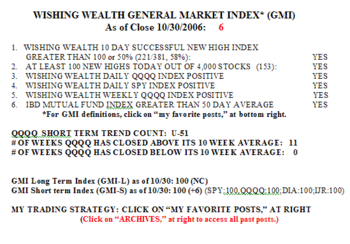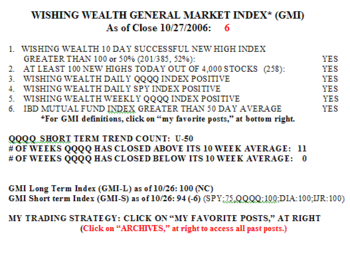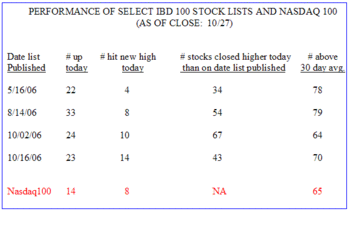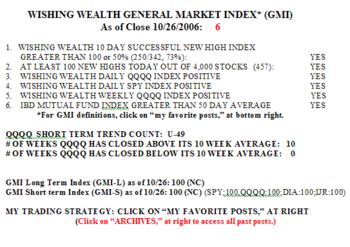The GMI is still 6, as 68% of the Nasdaq 100 stocks rose on Monday, along with 60% of the S&P 500 stocks and 50% of the Dow 30 stocks. Only 153 stocks in my universe of 4,000 stocks hit a new high.  Monday was the 51st day of the current QQQQ up-trend and the GMI-S is back to 100.
Monday was the 51st day of the current QQQQ up-trend and the GMI-S is back to 100.
All Posts
GMI: 6; GMI-S: 94; IBD 100 stock performance; Put/call ratio: .94
The GMI held at 6, but only 14-20% of the stocks in the Nasdaq 100, S&P 500 and Dow 30 indexes advanced on Friday.  There were 258 new highs in my universe of 4,000 stocks. The GMI-S fell to 94, with the weakening of one of the short term indicators for the QQQQ. Still, Friday was the 50th day in the current QQQQ up-trend and the 11th week that it has closed above its 10 week average.
There were 258 new highs in my universe of 4,000 stocks. The GMI-S fell to 94, with the weakening of one of the short term indicators for the QQQQ. Still, Friday was the 50th day in the current QQQQ up-trend and the 11th week that it has closed above its 10 week average.
The IBD 100 stock lists that I have been following did a little better than the Nasdaq 100 stocks on Friday.  22-33% of the stocks in the four lists below advanced on Friday. The list from 10/16 had 14 new highs, but only 43% of these 100 stocks closed higher than they closed on 10/16 when the list was published. The 14 stocks from the 10/16 list that hit new highs on Friday were: HXM,CELG,DRIV,JLL,GRMN,ROG,WCG,TV,SIM,
22-33% of the stocks in the four lists below advanced on Friday. The list from 10/16 had 14 new highs, but only 43% of these 100 stocks closed higher than they closed on 10/16 when the list was published. The 14 stocks from the 10/16 list that hit new highs on Friday were: HXM,CELG,DRIV,JLL,GRMN,ROG,WCG,TV,SIM,
CTSH,BLUD,WRLD,HCSG, CSH.
Monday’s IBD says that the put/call ratio from Friday was .94. As long as there remains such a high amount of pessimism exhibited by the options players, this rally probably has further to go. Put/call ratios near one are rare and typically occur only after a sustained decline. This is a rally that traders love to hate…..
GMI: 6; Growth is alive
The GMI is still 6. There were 457 new yearly highs in my universe of 4,000 stocks.  81% of the Nasdaq 100 stocks rose on Thursday, along with 69% of the S&P 500 stocks and 53% of the Dow 30 stocks. 68% of the IBD 100 stocks from 10/16 rose and there were 22 new highs among them. Taken together, it looks like the tech and growth stocks are rising..
81% of the Nasdaq 100 stocks rose on Thursday, along with 69% of the S&P 500 stocks and 53% of the Dow 30 stocks. 68% of the IBD 100 stocks from 10/16 rose and there were 22 new highs among them. Taken together, it looks like the tech and growth stocks are rising..